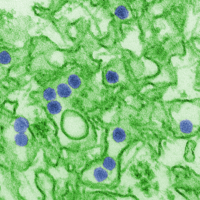
Photo from wikipedia
OBJECTIVE To determine the clinical phenotype of Guillain-Barré syndrome (GBS) after Zika virus (ZIKV) infection, the anti-glycolipid antibody signature, and the role of other circulating arthropod-borne viruses, we describe a… Click to show full abstract
OBJECTIVE To determine the clinical phenotype of Guillain-Barré syndrome (GBS) after Zika virus (ZIKV) infection, the anti-glycolipid antibody signature, and the role of other circulating arthropod-borne viruses, we describe a cohort of GBS patients identified during ZIKV and chikungunya virus (CHIKV) outbreaks in Northeast Brazil. METHODS We prospectively recruited GBS patients from a regional neurology center in Northeast Brazil between December 2014 and February 2017. Serum and CSF were tested for ZIKV, CHIKV, and dengue virus (DENV), by RT-PCR and antibodies, and serum was tested for GBS-associated antibodies to glycolipids. RESULTS Seventy-one patients were identified. Forty-eight (68%) had laboratory evidence of a recent arbovirus infection; 25 (52%) ZIKV, 8 (17%) CHIKV, 1 (2%) DENV, and 14 (29%) ZIKV and CHIKV. Most patients with a recent arbovirus infection had motor and sensory symptoms (72%), a demyelinating electrophysiological subtype (67%) and a facial palsy (58%). Patients with a recent infection with ZIKV and CHIKV had a longer hospital admission and more frequent mechanical ventilation compared to the other patients. No specific anti-glycolipid antibody signature was identified in association with arbovirus infection, although significant antibody titres to GM1, GalC, LM1, and GalNAc-GD1a were found infrequently. CONCLUSION A large proportion of cases had laboratory evidence of a recent infection with ZIKV or CHIKV, and recent infection with both viruses was found in almost one third of patients. Most patients with a recent arbovirus infection had a sensorimotor, demyelinating GBS. We did not find a specific anti-glycolipid antibody signature in association with arbovirus-related GBS.
Journal Title: Journal of the Neurological Sciences
Year Published: 2021
Link to full text (if available)
Share on Social Media: Sign Up to like & get
recommendations!